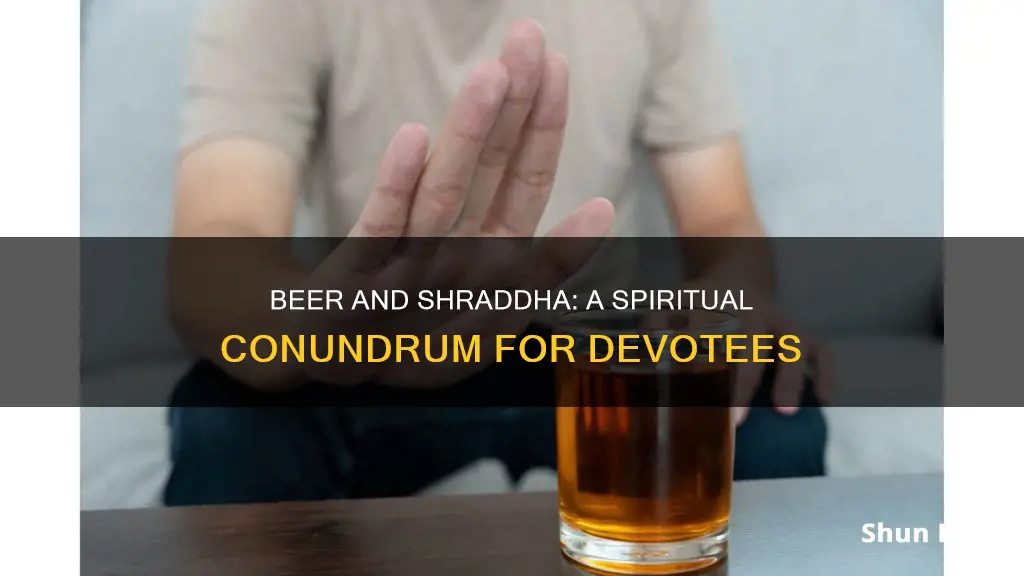
Shradh is a 16-day lunar period in the Hindu calendar, falling in the month of Bhadrapada and preceding Navratri. During this time, Hindus pay homage to their ancestors, praying for their peaceful state in the afterlife. It is believed that the souls of the three preceding generations reside in Pitru-Loka, a realm between heaven and earth, led by the god of death, Yama. To help liberate their ancestors' souls from this state and help them gain entry into heaven, Hindus perform pujas and make offerings of food and other items to priests and Brahmins. It is considered inauspicious to start anything new during this period, and one must refrain from consuming meat, eggs, alcohol, and certain other foods such as onion and garlic.
What You'll Learn

Alcohol is prohibited during Shradh
Shradh, or Pitru Paksha, is a 16-day lunar period in the Hindu calendar month of Bhadrapada, dedicated to paying homage to and praying for deceased ancestors. During this time, Hindus perform rituals and make offerings to liberate their ancestors' souls from the cycle of life and death and help them attain salvation.
In addition to abstaining from alcohol, those performing Shradh rituals must also avoid meat, eggs, onions, garlic, and stale or rotten fruits and grains. They must also remain celibate and refrain from any indulgences or celebrations. It is also considered inauspicious to begin anything new during this time, including buying new items or receiving good news.
Tech Football and Beer: What's Allowed?
You may want to see also

Beer is considered a 'worldly pleasure'
Shradh is a 16-day lunar period in the Hindu calendar, dedicated to paying homage to ancestors and their departed souls. During this period, Hindus offer prayers and perform rituals to seek blessings and forgiveness from their ancestors. It is believed that the souls of the preceding three generations reside in Pitru-Loka, a realm between heaven and earth, led by the god of death, Yama. Here, they continue to experience sensory demands of the body, such as hunger, thirst, heat, and pain.
Observing an all-vegetarian diet is a crucial aspect of Shradh. Meat, chicken, eggs, and alcoholic beverages, including beer, are avoided. These substances are considered inauspicious and are regarded as worldly pleasures that can hinder the liberation of the ancestors' souls from the cycle of birth and death, delaying their salvation.
Beer, being an alcoholic beverage, falls under this category of forbidden indulgences during the Shradh period. It is believed that consuming such worldly pleasures can provoke the wrath of the ancestors, leading to difficulties and failures in life. Therefore, abstaining from beer and other alcoholic drinks is considered essential to maintaining reverence and respect for the departed souls during Shradh.
The consumption of beer is viewed as a worldly pleasure due to its ability to provide a sense of enjoyment and pleasure beyond basic necessities. Beer has a long history as one of the oldest alcoholic drinks, dating back to ancient civilizations. It has played a significant role in social traditions and activities, such as festivals, pub quizzes, and games. The process of brewing and consuming beer has evolved over time, with different regions developing their own unique varieties and traditions.
In conclusion, beer is considered a worldly pleasure, and during the sacred period of Shradh, Hindus refrain from consuming it to show respect for their ancestors and to facilitate their souls' liberation and salvation.
Beer Drinking in Alaska: What's the Deal?
You may want to see also

Drinking alcohol may hinder the liberation of ancestors' souls
Shradh is a 16-day lunar period in the month of Bhadrapada, where Hindus pay homage to their ancestors and pray for their peaceful afterlife. During this time, it is advised to abstain from alcohol and meat, as these are considered inauspicious and may hinder the liberation of ancestors' souls.
The consumption of alcohol and non-vegetarian food is believed to be a worldly pleasure that could impede the liberation of the ancestors' souls from the cycle of birth and death. The ritual, Shradh, is a way of informing the departed that they are still an essential part of the family and will continue to be included in every happiness and sorrow. By abstaining from alcohol, the living can show that they are fully present and focused on their ancestors.
The period of Shradh is dedicated to performing rituals and making offerings to the ancestors, requesting forgiveness, and seeking their blessings. It is believed that the souls of the three preceding generations reside in Pitru-Loka, a realm between heaven and earth, led by the god of death, Yama. Here, the ancestors are subject to the sensory demands of the body, such as hunger, thirst, heat, and pain. The offerings and rituals performed by their succeeding generations can provide relief and help liberate them, allowing them to gain entry into heaven.
If the rituals are not performed properly or if the customs are not followed, it is believed that the ancestors may become angry and curse their successive generations, resulting in Pitru Dosha. This can bring about difficulties and unexplained failures in life. Therefore, it is essential to adhere to the customs and abstain from alcohol during this period to ensure the liberation of the ancestors' souls and receive their blessings.
The consumption of alcohol can have significant impacts on the body and mind, including impaired coordination, changes in mood and behavior, digestive issues, and increased risk of cancer and other diseases. These effects may hinder one's ability to perform the rituals and offerings with the focus and reverence required. By abstaining from alcohol, individuals can ensure they are in a state of physical and mental clarity, fully capable of performing the rituals and honoring their ancestors.
Jumping, Beer, and Sky Zone: Is it Allowed?
You may want to see also

Alcohol is forbidden to offer to Lord Vishnu
Shradh is a 16-day lunar period in the Hindu calendar month of Bhadrapada, during which Hindus pay homage to their ancestors. During this time, they pray for their ancestors' peaceful state in the afterlife and perform the Shradh ritual, which is mentioned in the Vedas and Puranas.
The Shradh ritual involves performing pujas and offering food to priests and Brahmins. It is believed that the souls of the three preceding generations reside in Pitru-Loka, a realm between heaven and earth ruled by the god of death, Yama. Here, the souls are subject to sensory demands of the body, such as hunger and thirst, which can only be relieved by the offerings and rituals performed by their successors.
During Shradh, Hindus generally observe an all-vegetarian diet and abstain from alcohol. This is because non-vegetarian food and alcohol are considered inauspicious and are believed to hinder the liberation of the souls of the ancestors from the cycle of birth and death.
Before offering food to the ancestors and Brahmins, the food is first offered to Lord Vishnu. It is considered a sin to offer Lord Vishnu any food or drink that contains meat, eggs, or alcohol. This is because these substances are considered to be Tamsik, or impure, and offering them to Lord Vishnu is believed to be an act of adharma, or unrighteousness.
The Garuda Purana, a Hindu scripture, mentions the judicious use of wine, stating that it "gives the ability to work, helps the natural functions, and blesses with beauty." However, other scriptures, such as the Manusmriti and Chandogya Upanishad, forbid alcohol consumption, with the latter stating that drinking alcohol is one of the five biggest sins.
Therefore, while there are varying views on alcohol consumption in Hinduism, it is clear that offering alcohol to Lord Vishnu is forbidden.
Beer and Lifting Weights: A Healthy Balance?
You may want to see also

Drinking alcohol may result in the 'curse of ancestors'
Shradh is a 16-day lunar period in the month of Bhadrapada, observed by Hindus as homage to their ancestors. During this period, they perform rituals and offer food to priests and Brahmins to pray for their ancestors' peaceful state in the afterlife.
Drinking alcohol is prohibited during Shradh. This is because the period is dedicated to ancestors, and alcohol is considered a worldly pleasure that may hinder the liberation of ancestors' souls. Consuming alcohol during Shradh is believed to provoke the wrath of ancestors, resulting in their curse and difficulties in one's life.
The consumption of alcohol is generally discouraged in Hinduism. It is seen as a sin and is believed to lead to poverty, ruin, and hell. Alcohol is considered to interfere with one's senses and affect decision-making, contributing to family breakups and tragic deaths.
The Bible also contains warnings and curses against drinking alcohol, referring to it as a "mocker" and "raging". It is believed that alcohol causes individuals to lose control, leading to shameful and sinful behaviour.
Therefore, drinking alcohol during Shradh is considered a mistake that may anger the ancestors and bring about their curse.
Beer and Axes: Is It Safe to Mix?
You may want to see also
Frequently asked questions
No, alcohol consumption is prohibited during Shradh.
Shradh is a 16-day lunar period dedicated to the service of deceased ancestors. Alcohol is considered a worldly pleasure that may hinder the liberation of ancestors' souls from the cycle of birth and death.
Meat, eggs, onions, garlic, tobacco, and sexual activity are also prohibited during Shradh.







